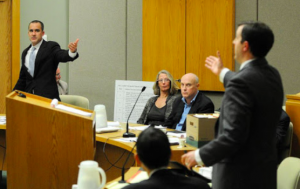An extremely experienced, knowledgeable, and successful executive who happens to be an attorney sent this yesterday – and with their permission, I’m sharing it with you.
Briefly…
From the executive:
I read this
morning’s post with interest——if WC insurers (erroneously) believe that they could arbitrarily deny those WC claims presented by workers who are (or will soon be) infected by COVID19 —those insurers will soon discover that the current pandemic situation and the related economic impact it is already bringing to our markets is REAL—and something that should be addressed with the greatest degree of care.
Here’s why: If insurers haven’t yet understood….this pandemic is different. This will change…everything. And that includes the customary defenses and general traditional methodologies that WC insurers have used to deny or delay WC claims.
The typical “within the course and scope of work” argument works in 95% of the claim scenarios where there may be a legitimate question of fact——it is not likely to work under situations created by a pandemic. Service workers (such as those you listed in your post) have very little if any choice but to present themselves for work.
No show? No job.
So, the “social compact” between the employer and the employee changes—fundamentally. If the worker must be at work — I’m thinking here of healthcare workers, (doctors, nurses, medical technologists, orderlies, nursing assistants, etc.) and they come in contact with an infected patient and become infected themselves——that contraction is in fact within the course and scope.
This pandemic is going to give us a new legal paradigm——the threshold for contact with an airborne pathogen is presenting a new qualifier. The industry’s leaders are working from a very old, very tired circa 1980s-1990s mindset. All the old arguments are completely useless.
There is something else for the insurers to think about—and this is what you were striking at in your blog:
If an insurer decides to “fight” the compensability issue——given the potential size of a class of workers that will be adversely affected—it may be a decision that will eventually lead to financial ruin for that insurer.
Yeah…this isn’t going to cut it any more.
Denial of the claims will surely lead to litigation. With such a peculiarly large class of individuals involved (safe guess, in the hundreds of thousands before this is all over). Inviting a wave of litigation will cost the insurer truckloads of defense costs (ALAE). Those costs will lead to larger than necessary loss costs and settlements. When the insurer eventually wakes up and sees the magnitude of the issue those attendant cost drivers will have already significantly adversely affected both the insurer’s loss ratios and reserves.
Those escalated costs will also negatively impact the loss experience of the policyholders—the employers.
Given enough backlash, policyholders will vote with their feet——rapidly. The insurer will lose significant market share and revenue; lower revenue means less investment income. Less investment income coupled with dramatically declining claim management performance and escalating loss payments……well…..you get the picture.
This is what is now known as “social inflation.” The topic has been rising and gathering more attention in the industry—usually in other lines of business (more on that some other time). We didn’t need a pandemic to figure out that there are certain types of losses—certain liability scenarios — that give rise to social backlash. Other examples exist wherever we see egregious behavior by corporate ostriches:
- the class action settlements in Monsanto’s Round-up claims——
- Johnson & Johnson’s brazen defenses in the emerging talc powder class action claims…..coming on the tail of a cluster of very high punitive damage awards from juries in the initial individual claims.
What does this mean for you?
Hard charging defense—or denial of claims in WC just ain’t gonna cut it with this pandemic. The world of risk has changed. And COVID19 is here to prove just how much that change will impact the industry….and just about everything else.





Great post. For the vast majority of those infected the cost of servicing the claim will be relatively inexpensive. The cost of litigating them will be disastrous, both from a financial and reputational sense.
Denial is not just a river in Egypt.
Thanks Joe for this superb post. Insurers and employers must act with integrity, doing what is right. There must be a change from prior archaic constructs which result in needless human and financial costs.
These certainly are game changing times. I am wondering how the contractual language clause of “force majeure” will factor into this this conversation. Any thoughts?
Hello Anna – I suppose it depends on how and where it is used. Not sure if there are any instances where it would enable employers/insurers to avoid paying for workers’ comp; TRIA was set up specifically to accommodate the potentially huge risks inherent in a massive terrorist event, so it appears to my non-legal brain that WC is not exempt from unforeseen events. But I defer to attorneys on this…
good question – thanks Joe